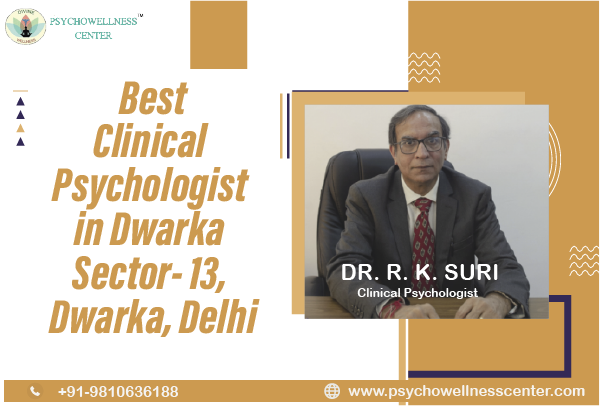Stress has become an unavoidable aspect of daily life in the modern, fast-moving world. The demands of work, personal relationships, and societal expectations can lead to chronic stress, which negatively impacts both mental health and physical well-being. Prolonged stress is associated with anxiety disorders, depression, hypertension, cardiovascular diseases, sleep disturbances, and burnout.
Understanding stress’s psychological mechanisms and applying scientifically validated stress management techniques are essential for effectively managing it. Psychowellness Center in Dwarka, a leading mental health clinic, offers expert guidance and therapy for individuals struggling with stress. Its team of highly qualified clinical psychologists, including Dr. R. K. Suri, Mrs. Kala Sengupta, Mr. Utkarsh Yadav, Ms. Sakshi Dhankhar, and Ms. Tanu Sangwan, specialises in evidence-based approaches to stress reduction.
Understanding Stress from a Clinical Perspective
Stress is the body’s natural response to external or internal demands that exceed an individual’s coping ability. While short-term stress can be beneficial in motivating individuals to perform tasks efficiently, chronic stress can lead to mental health disorders and physical health deterioration.
According to clinical psychology, chronic stress contributes to the development of:
- Generalised Anxiety Disorder (GAD) – A condition characterised by persistent, excessive, and uncontrollable worry about various aspects of daily life.
- Major Depressive Disorder (MDD) – Long-term feelings of sadness, hopelessness, and loss of motivation.
- Adjustment Disorder – Emotional distress following significant life changes or stressful events.
- Panic Disorder – Sudden episodes of intense fear accompanied by physical symptoms such as rapid heartbeat and dizziness.
- Obsessive-Compulsive Disorder (OCD) – Repetitive thoughts or behaviours aimed at reducing stress.
At Psychowellness Center, psychologists conduct psychometric assessments, structured clinical interviews, and neuropsychological evaluations to diagnose stress-related conditions and design personalised treatment plans.
Common Stress Triggers in a Fast-Paced World
- Workplace Stress – Long working hours, job insecurity, and high expectations contribute to occupational burnout and chronic fatigue syndrome.
- Technological Overload – Constant exposure to digital devices affects dopamine regulation and increases mental fatigue.
- Relationship Conflicts – Unresolved interpersonal issues often lead to adjustment disorders and low self-esteem.
- Health Concerns – Ignoring psychosomatic symptoms can escalate stress and lead to severe health problems.
At Psychowellness Center, top psychologists specialise in helping individuals identify these triggers and apply cognitive-behavioural therapy (CBT), mindfulness-based stress reduction (MBSR), and relaxation techniques to manage stress effectively.
Evidence-Based Stress Management Techniques
1. Cognitive-Behavioral Therapy (CBT)
CBT is a scientifically validated intervention for stress management. It helps individuals identify and challenge negative thought patterns that contribute to stress and replace them with healthier coping mechanisms.
2. Mindfulness and Meditation
Mindfulness-based stress Reduction (MBSR) is an effective therapy that focuses on present-moment awareness. Research shows that it reduces cortisol levels, improves emotional regulation, and enhances overall well-being.
3. Time Management and Behavioral Activation
Time mismanagement often leads to overwhelming stress. Developing effective time management skills can significantly reduce stress and increase productivity.
4. Progressive Muscle Relaxation (PMR) and Deep Breathing Exercises
PMR and deep breathing techniques are widely used in clinical psychology to reduce muscle tension and autonomic hyperactivity, which are common in stress-related disorders.
5. Lifestyle Modifications and Nutrition Counselling
A balanced diet, regular exercise, adequate sleep, and hydration are crucial for stress management. Poor lifestyle choices can worsen stress symptoms and lead to neurobiological imbalances.
6. Social Support and Group Therapy
Building a strong support system is essential for stress resilience. Group therapy provides a safe space for individuals to share experiences and receive emotional support.
7. Digital Detox and Limiting Screen Time
Excessive screen time can lead to digital burnout and mental exhaustion. Setting boundaries for digital use can improve mental clarity and reduce stress.
The Role of Psychowellness Center in Stress Management
Located in Dwarka, Psychowellness Center is a premier mental health clinic offering comprehensive stress management programs. Their approach is rooted in clinical psychology and focuses on evidence-based therapeutic interventions.
Expert Psychologists at Psychowellness Center
- Dr. R. K. Suri, a senior clinical psychologist, specialises in cognitive restructuring, a CBT technique that helps clients reframe their perception of stressors and build psychological resilience.
- Mrs. Kala Sengupta and Ms.Sakshi Dhankhar, experts in mindfulness-based therapy, guide clients through structured meditation techniques to help them manage stress and reduce emotional dysregulation.
- Mr. Utkarsh Yadav is known for his structured approach, which helps clients implement behavioural activation strategies, ensuring they set realistic goals and maintain a healthy work-life balance.

